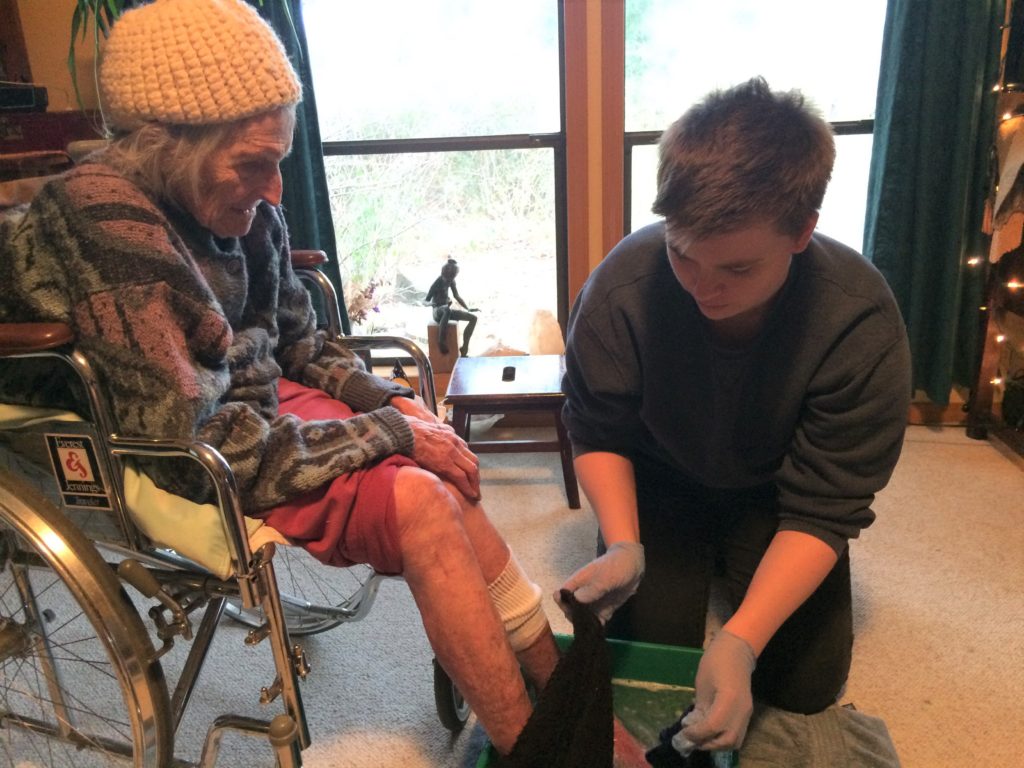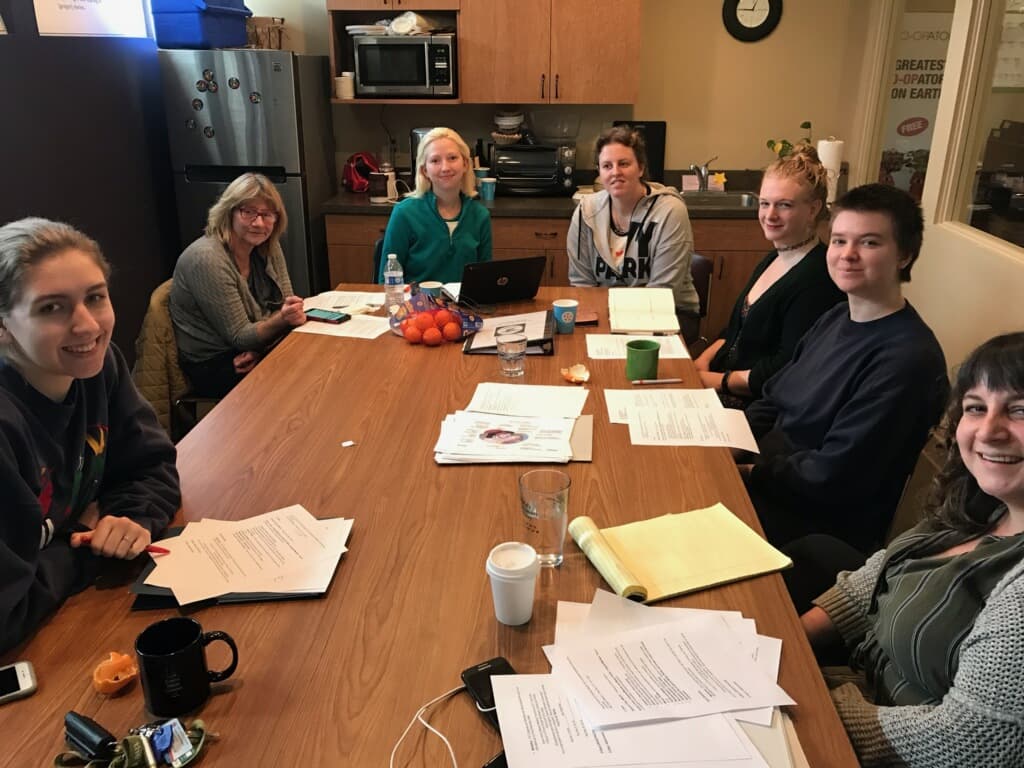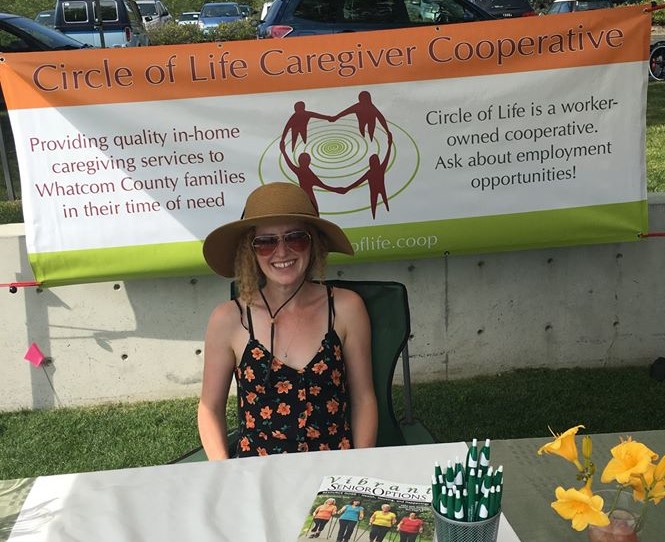Northwest Cooperative Development Center hopes to transform an industry
by Karen Kahn

Home care workers have tough jobs. Average wages hover around $11.52 per hour, hours can be sporadic, and often workers are given little respect for the valuable service they provide. In fact, in many areas of the country, the poor quality of jobs is causing a severe shortage of caregivers. In Washington State, the Northwest Cooperative Development Center (NWCDC) is trying to create a new industry model: worker cooperatives, where caregivers can take control of their working conditions.
The largest worker cooperative in the country, by head count, is Cooperative Home Care Associates (CHCA), a 35-year-old home care provider in the South Bronx. Because of the generous home care supports provided to Medicaid clients in New York City, CHCA has grown to about 2,000 workers, most of whom are women of color. Washington’s co-ops are on a much smaller scale, but they have imported the “quality care through quality jobs” model championed by CHCA.
Currently, Washington State has four home care cooperatives, all of which are serving the private pay market. This means that clients pay out of pocket—on average about $30 per hour. NWCDC cooperative developer Deborah Craig says that workers would like to be able to serve clients who have fewer resources, but until the agencies can qualify for contracts with the state Medicaid program, it isn’t feasible. Workers need to earn a livable wage, and lower fees would undercut their ability to support their families. Cooperative members earn between $15 and $18 per hour.
The co-ops have annual turnover of about 30 percent, as compared to 82 percent at private agencies. The high level of retention benefits clients, who receive more consistent and better-quality care.
The four co-ops serve communities in Western Washington: Olympia, the state capital; Port Townsend, a retirement community with the distinction of having the state’s oldest population; Bellingham and surrounding Whatcom County; and Port Angeles, which is located on the Olympic Peninsula. Circle of Life, located in Bellingham, is the longest operating of the co-ops. At its recent 10th anniversary, the co-op had about 35 employees, the majority of whom are worker-owners. Ridgeline, which has just launched in Port Angeles, has 10 caregivers.
The cooperative experience is empowering. Nora Edge, a founding owner of Capital Homecare and its administrator, explains that after caring for her grandfather and then working as a professional caregiver for 15 years, she wanted to stay in the field. “But caregiving jobs usually don’t pay a living wage,” she says. “The hours can be grueling, and there are few opportunities for professional development.” When she discovered that people were developing a cooperative, she was all in.

Capital Homecare is owned and operated by its workers, which, Edge explains, eliminates the top-down experience of working at most agencies. The usual chasm of understanding between the office schedulers and the workers in the field is eliminated because the workers themselves set policy. They also share in the profits, an incentive that increases every co-op member’s investment in the success of the company.
In addition, while most home care agencies have few if any advancement opportunities, at co-ops workers develop administrative and other skills by serving on the board and committees. At Capital Home Care, one member, for example, moved from finance committee to becoming the Board Treasurer. Another, who helped to write the co-op’s by-laws is thinking of law school.
We don’t work for somebody, we work with Circle of Life,” says nursing assistant Kelsey Porter.

Kelsey Porter, who is a member of Circle of Life, serves on the board of directors as well as the education and finance committees. She helped to write a grant to develop continuing education content, and she is now one of the lead writers for the curriculum. Though she only works part-time as a caregiver (Circle of Life is a second job), at Circle of Life she is thrilled by the opportunity to be a decision maker in an organization that she loves. Porter describes co-op membership in terms of “not working for somebody but working with Circle of Life.”
Ownership changes the way people view their jobs, says Craig. Their commitment to success has a profound impact. The co-ops have annual turnover of about 30 percent, as compared to 82 percent at private agencies. The high level of retention benefits clients, who receive more consistent and better-quality care.
Craig offered two examples of how the home care cooperatives distinguish themselves. She noted, in many agencies, it is forbidden for caregivers to talk about their clients. But the cooperatives encourage caregivers serving the same clients to see themselves as a team and to make sure everyone is on the same page. By communicating with one another, the team provides better care.
The co-ops are also more sensitive to issues of discrimination that often arise in home care situations. Clients, particularly those with dementia, may express racist, sexist, or homophobic attitudes. As a co-op, Capital Home Care enabled workers to talk through these issues and developed a process for matching clients and workers that takes into consideration the worker’s level of comfort as well as the client’s needs. As such, the co-op has developed a reputation as a good workplace for trans and nonbinary workers. In turn, NWCDC sees an opportunity to market the co-op to LGBTQ elders who may be fearful of inviting unvetted workers who are not familiar with LGBTQ culture into their homes.
Developing each cooperative, says Craig, takes nine months to a year. She has grant funding to go into communities and recruit caregivers, but it is often difficult to find times to meet and to sustain the effort. Caregivers have to work to earn a living—and they change jobs often, looking for a slightly higher wage or better working conditions. A recent increase in the union wage for workers in the state’s Medicaid personal care program has created more competition for workers, which has slowed growth.
But the four co-ops have been financially successful, usually earning enough annual profit to provide a bonus equivalent of about $2 for each hour worked over the course of the year. With that track record, NWCDC has raised additional funding to hire another cooperative developer focused on the home care sector. Craig and her new colleague are exploring interest in Yakima County, a more conservative area of the state, to see if they can build the same enthusiasm. The dream is to supplant the private agencies and, eventually, says Craig, “own the industry.”
Karen Kahn is a communications consultant and the editor of Employee Ownership News.
To follow Employee Ownership News, subscribe to the Fifty by Fifty newsletter or follow us at Medium.
